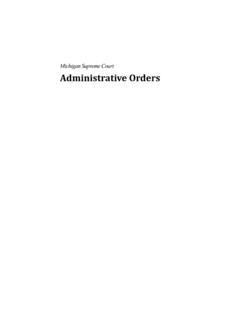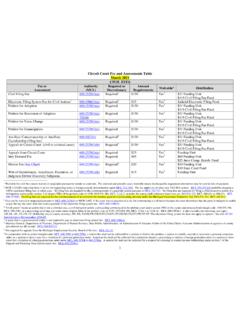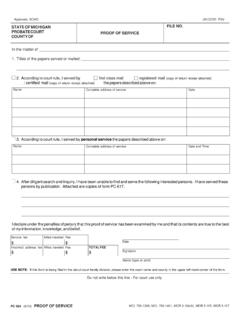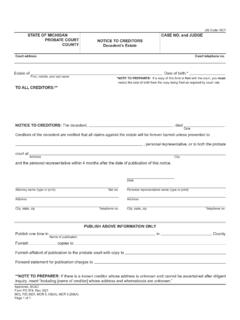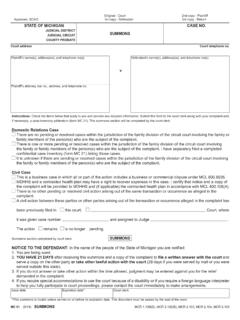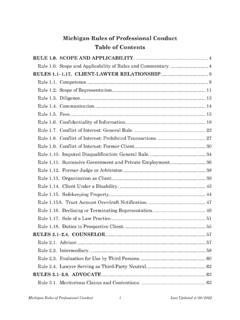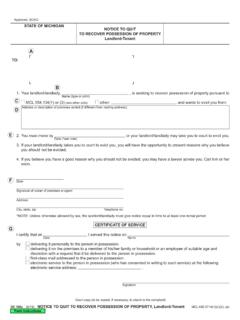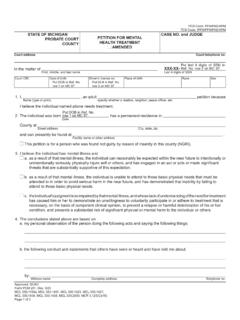Transcription of Manual for Court Reporters and Recorders
1 Manual FOR Court Reporters AND Recorders Published by the State Court Administrative Office PO Box 30048 Lansing, Michigan 48909 Section 1: Introduction Table of Contents Page Chapter 1 Role of the Court Reporter/Recorder 1 Chapter 2 Conduct of the Court Reporter/Recorder A. Code of Conduct 1 B. Guidelines for Professional Practice 3 C. Guidelines for Professional Ethics 3 Chapter 3 Conflict of Interest 4 Chapter 4 Associations 4 rev. 7/16 Section 1: Introduction Page 1 Section 1: Introduction Chapter 1: Role of the Court Reporter/Recorder As used in this Manual , the term reporter means a shorthand reporter, stenomask reporter, or a voice writer. The term recorder means an electronic recorder. The Court reporter or recorder is an integral part of the justice system. As such, he or she is subject to the requirements of Michigan Court Rules, Michigan statutes, and this Manual .
2 This applies to all Court Reporters and Recorders , whether official, per diem (by the day), or freelance. The Court reporter or recorder makes and maintains the verbatim permanent record of all proceedings. That permanent record must be a complete and accurate record. To perform this function, the reporter or recorder must be competent, punctual, and willing to work long hours. The skills of a reporter or recorder include the ability to report or log accurately and quickly; proficiency at transcribing; and expertise at spelling, punctuation, grammar, neatness, speed, and organization. Chapter 2: Conduct of the Court Reporter/Recorder The reporter or recorder must be impartial, patient, dignified, and courteous and should conform personal conduct to high professional and personal standards.
3 The reporter or recorder should be a respected citizen of good moral character and complete trustworthiness. A. Code of Conduct When working in the capacity of an official Court reporter or official Court recorder, the reporter or recorder is an officer of the Court and part of the Court staff. He or she is subject to the same high standards of conduct above reproach, fidelity, and diligence that apply to the judge. (Code of Judicial Conduct, Canon 3[B][2]) He or she should always recognize that an independent and honorable Court is indispensable to justice in our system. The judicial system is for the benefit of the litigant and the public, not the Court or its staff. (Code of Judicial Conduct, Canon 1) As stated in The State Trial Judge's Book, published under the sponsorship of the National Conference of State Trial Judges, the justice system requires that the reporter or recorder understands that: 1.
4 The reporter or recorder of the Court must reflect credit upon the Court , the judge, and their profession, and that this extends to his or her personal, as well as official life. 2. communications between the reporter or recorder and the judge are to be highly confidential. Section 1: Introduction Page 2 3. the reporter or recorder must respect the justice system at all times. 4. the reporter or recorder should be punctual and efficient. 5. the reporter or recorder should not give advice to anyone concerning any matter in the Court or any matter that could end up in Court . 6. the reporter or recorder should never purport to speak or act for the judge where judicial matters are involved. 7. unless specifically authorized, the reporter or recorder should never exercise the Court 's discretion, as in excusing jurors or setting hearings.
5 8. the reporter or recorder should not discuss the merits of any case. 9. the reporter or recorder should be careful not to leave the impression with anyone that he or she could or would talk to the judge about a case or that he or she knows what the judge is going to do. 10. the reporter or recorder should not express an opinion as to how a case should be decided or what verdict a jury will return. In other words, he or she should not take sides in any proceeding. 11. when working in the Court , the reporter or recorder should not permit anyone to dictate anything into the record out of the judge's presence or without the judge's knowledge. 12. the reporter or recorder should never improperly interpose himself or herself between the judge and others. 13. the reporter or recorder must not neglect the work of the Court in order to perform outside work.
6 14. if the reporter or recorder is an attorney, he or she is not to practice law in the Court served as an official Court reporter or official Court recorder. 15. the Court reporter or recorder should maintain notes and records, stenographic tapes, or discs in accordance with law and the Michigan Trial Court Case File Management Standards. 16. if the reporter's or recorder's employment is terminated, she or he will promptly transcribe and deliver all notes, records, and completed transcripts as requested. (National Conference of State Trial Judges Book Revision Committee, The State Trial Judge's Book [ St. Paul: West Publishing Co, 2nd ed, 1969], pp 11-12) As an officer of the Court , the reporter or recorder should always recognize that an independent and honorable Court is indispensable to justice in our system.
7 The judicial system is for the benefit of the litigant and public, not the Court or its staff. (Code of Judicial Conduct, Canon 1) Section 1: Introduction Page 3 B. Guidelines for Professional Practice Common sense, professional courtesy, statutes, and Court rules should guide Reporters and Recorders in applying these guidelines. In making records, Reporters or Recorders should: 1. accept only those assignments where their level of competence will result in the preparation of an accurate transcript. A reporter or recorder should remove himself or herself from an assignment when he or she believes his or her abilities are inadequate, and should recommend or assign another person if that person has the competence required for such assignment. 2. prepare the record in accordance with transcript preparation guidelines established by statute, Court rule, local custom and usage, and this Manual .
8 3. notify, whenever possible, the parties engaging the reporter or recorder if a substitute reporter or recorder will be assigned. 4. make timely delivery of transcripts, meet promised delivery dates, and make notification of delays. 5. strive to become and remain proficient in his or her professional skills. 6. keep abreast of current literature, technological advances and developments, and participate in continuing-education programs and professional organizations. 7. cooperate with the bench and bar for improvement of the administration of justice. 8. cooperate with qualified legal assistance organizations providing free legal services to the indigent as part of a commitment to the principle that legal services should be available to all. Such participation should be in accordance with the basic tenets of the profession: impartiality, competence, and integrity.
9 C. Guidelines for Professional Ethics A reporter or recorder shall: 1. be fair and impartial toward each participant in all aspects of reported proceedings and always offer to provide comparable services to all parties in a proceeding. 2. be alert to situations that are conflicts of interest or that may give the appearance of a conflict of interest. If a conflict or potential conflict arises, the reporter or recorder shall disclose that conflict or potential conflict. 3. guard against not only the fact, but also the appearance of impropriety. 4. preserve the confidentiality and ensure the security of information, oral or written, entrusted to the reporter or recorder by any of the parties in a proceeding. Section 1: Introduction Page 4 5. be truthful and accurate when making public statements or when advertising qualifications or the services provided.
10 6. determine fees independently, except when established by statute or Court order, and enter into no unlawful agreements with anyone. 7. refrain, as an official reporter, from freelance reporting activities that interfere with official duties and obligations. 8. refrain from giving, directly or indirectly, any gift, incentive, reward, or anything of value to attorneys, clients, witnesses, insurance companies, or any other persons or entities associated with a litigation, or to the representatives or agents of any of the foregoing, except for items that do not exceed $100 in the aggregate per recipient each year or pro bono services as defined by the NCRA Guidelines for Professional Practice or by applicable state and local laws, rules and regulations. 9. maintain the integrity of the reporting/recording profession and avoid being identified with controversies that would reflect negatively on the justice system.
